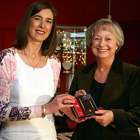ORFEO International – Reviews
Important Releases Briefly Introduced
August 2007
ORFEO 4 CD C 690 074 L
When Hans Knappertsbusch conjured up the sounds of the Prelude to 
Parsifal: ORFEO C 690 074 LAct One of Parsifal from the "mystic abyss" of the Bayreuth Festspielhaus in 1964, few in the audience can have suspected that this would be the seventy-six-year-old conductor's final season on the Green Hill. Retrospectively his performances at that year's Festival quickly came to be seen as the last in a performing tradition that dated back to the early years of the 20th century but which had also left a decisive mark on the style of New Bayreuth since its reopening in 1951. Knappertsbusch was arguably unique in his ability to bring a sense of tension to the specific qualities of the Bayreuth acoustic, with its well-blended, compact sound, while never allowing his broad tempos to sacrifice any of the details in Wagner's orchestral writing.
During his final season in Bayreuth, Knappertsbusch had at his disposal a team of singers fully capable of helping him to shape this synthesis of tonal fullness and the art of subtly nuanced interpretation. Prominent among the soloists in this live recording, which is now being released by the Bayreuth Festival in collaboration with Orfeo, is Jon Vickers in the title role. He first sang the part in Bayreuth in 1964, bringing to it a vocal power that took Festival audiences by complete surprise. 
ORFEO Manager Christiane Delank together with Mrs. Wagner on occasion of the news conference on 30 July 2007
Foto: Nordbayerischer KurierAs in virtually all the Canadian tenor's performances, the listener is additionally moved by the singer's ability to rein in his voice and produce the subtlest nuances, most notably in the Good Friday scene. His equal in this regard was the Gurnemanz of Hans Hotter, whose qualities as a lieder singer allowed him to create islands of extreme intimacy in the character's lengthy narrations. One of his great successors as Wotan in the Ring was Thomas Stewart, who is heard here as Amfortas, his somewhat lighter – but by no means lightweight – timbre and art of characterisation producing an outstanding psychological study of the ailing Grail king. His antagonist Klingsor is played by the indestructible Gustav Neidlinger, Bayreuth's legendary Alberich, whose pitch-black bass brought a real sense of menace to the part. It is also the dark colours of Barbro Ericson's Kundry that are the most fascinating aspect of her performance, her voluptuous contralto none the less able to master the awkward intervals and emotional outbursts of this complex character. The Bayreuth Festival Chorus under the direction of Wilhelm Pitz adds further lustre to this performance, while the luxury casting of the smaller parts, including Heinz Hagenau as a rich-voiced Titurel, leaves today's listener in no doubt that the myths that have grown up around this 1964 Parsifal are fully justified and timeless in their validity.
Previous releases in our series of live recordings from the Bayreuth Festival include:
Tristan und Isolde 23 July 1952 C 603033 D, Tannhäuser 9 August 1955 C 643043 D, Der Ring des Nibelungen August 13 – 17, 1956 and Lohengrin 4 August 1959.
top |